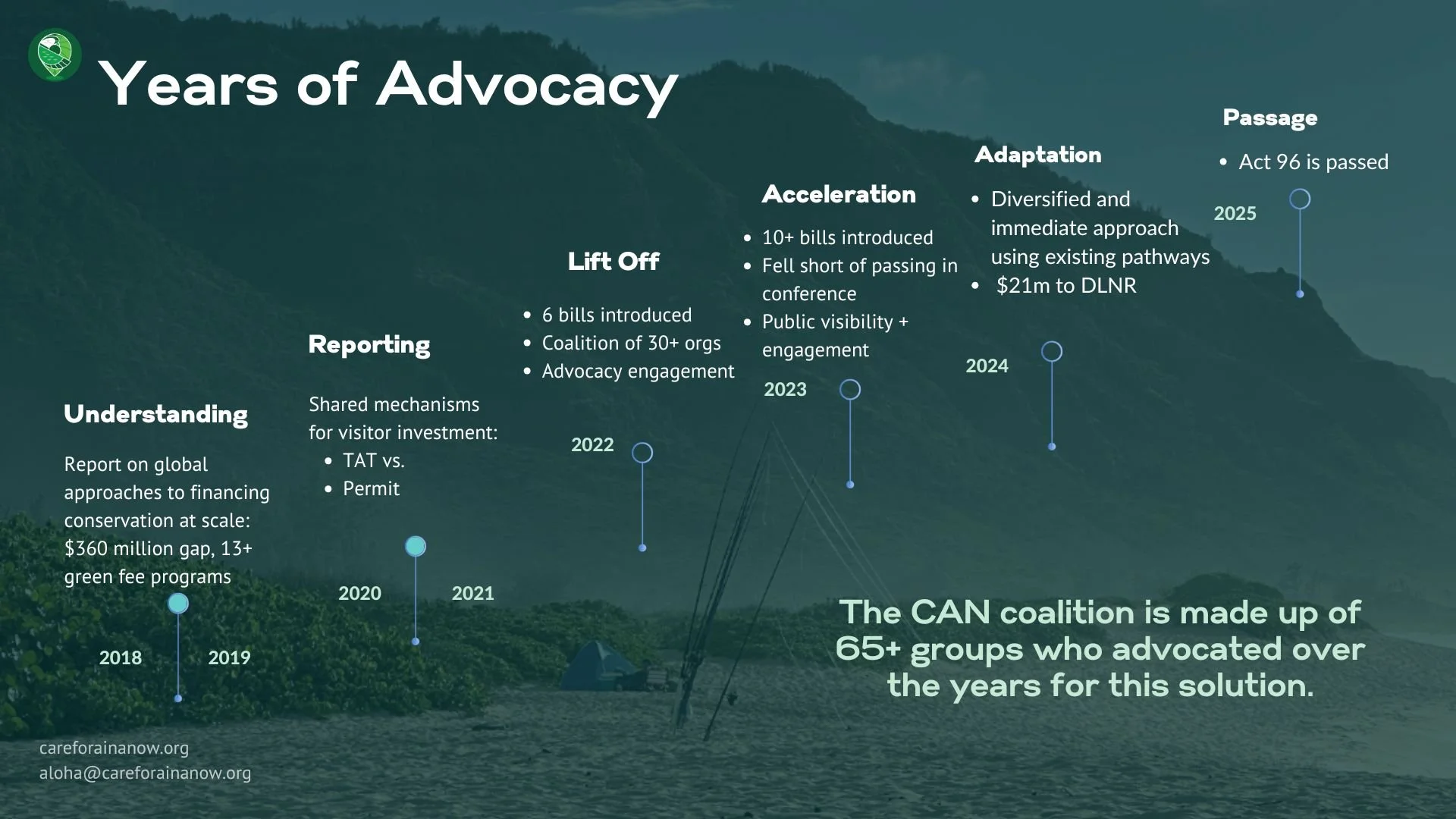
History
After six years of demanding urgent environmental investment in our ʻāina, Act 96 was passed into law in May 2025.
For years, Care for ʻĀina (CAN) advocated for immediate, transformational, and recurring funding to invest in climate resilience, rapid relief to our ʻāina and communities, and community-driven solutions. The new law will select projects annually, and we plan to be a voice for community as we now advocate for the final funded projects each year.
2025
In 2025, Act 96 passed as the first-of-its-kind visitor green fee in the nation. A 0.75% increase to the existing Transient Accommodations Tax will go toward climate solutions, generating an expected ~$100 million annually.
The funding raised will be split evenly to solutions in three key buckets: Sustainable Tourism, Natural Resource Management and Stewardship, and Climate Resilience.
2024
The devastation of the Lāhainā wildfires and extreme weather from climate change is no longer a distant risk, but an active threat to the safety of our communities across Hawaiʻi.
Our coalition initially released a single path forward through a visitor impact fee, but pivoted to push for establishing a dedicated, permanent fund for natural resource maintenance and restoration. Our lawmakers will determine the best sources for this fund, including the State budget, wildfire prevention measures, and ensuring the tourism tax gives back to our natural resources.
WIN: $21 MILLION FOR WILDFIRE RESILIENCE AND PREVENTION IN STATE BUDGET.
2023
Since taking office, Governor Josh Green has been a strong supporter of environmental policy and climate impact fees. The shifting political landscape of this change broadened visitor green fee attention and support by the Department of Land & Natural Resources, Attorney General’s office, and State representatives. Over 10 bills were introduced in 2023, with consistent press support, broad public involvement in testimony, and cross-sector participation throughout the process. The final environmental license bill, SB304, progressed through conference before dying without approval from the House Finance Committee. This was one step short of passing into law.
2022
The broad public support for a visitor green fee grew tremendously in 2022. Over six bills were introduced during the session, with an environmental license bill progressing significantly. A formal coalition of over 50 local nonprofits, community organizations, and businesses signed on in support to advocate for passing a bill into law. Members of this coalition facilitated public polling on the topic, revealing that two-thirds of Hawai’i voters supported a visitor green fee. Throughout the session, community members, youth, and advocates across the State urged political leaders to take action for future generations.
2021
The height of the pandemic highlighted the urgent need to build community resilience, diversify the economy, and protect the assets that support the livelihoods of our residents.
In 2021, our team worked with the Department of Taxation to report the legal and feasible policy approaches for a green fee, focused primarily on the Transient Accommodations Tax and an Environmental License.
This year also marked the first green fee related bills were introduced during the legislative session.
2020
The onset of the COVID-19 halted travel to Hawai’i indefinitely. Residents observed natural resources rebound without visitor impact, like the coral reefs of Hanauma Bay on O’ahu. The concept of regenerative tourism began to emerge, as residents called for solutions to protect our environment.
As tourists began to return, we watched thousands of visitors return to pay the Transient Accommodations Tax as part of their hotel bookings, but that funding was not returned back to care for the environment, even as visitors reaped the benefits of our beautiful ecosystems.
2018-2019
Over the last decade, the concept of visitor green fees was emerging at tourism destinations across the world. Conservation leaders in Hawai’i worked to evaluate and summarize those green fees in detail, as well as the potential approaches for one in Hawaii. Concurrently, conservation economists worked to estimate the annual conservation funding need and investment in Hawai’i, and found that we fall short on investing in our natural resources by $360 million a year.









